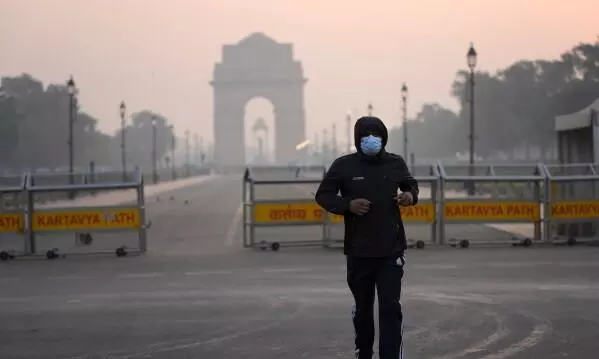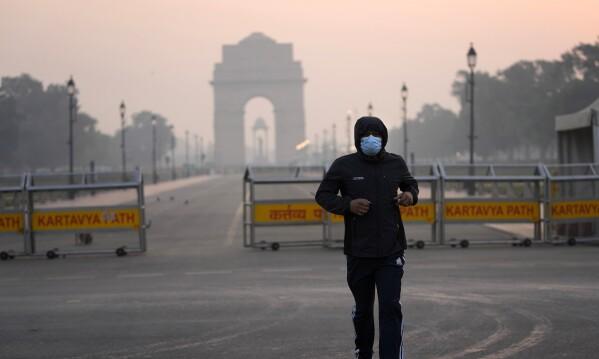
New Delhi: “When they stop our work, we don’t just lose the wages. It’s the food on our plates and the little we try to save for our children’s future,” says Raju Singh, a mason from Bihar.
He was one of thousands of migrant and local construction workers rendered jobless following the November 11 ban on constructions, prompted by the Delhi-NCR’s air quality plunging to hazardous levels.
More such bans are likely to follow throughout the winter. While that is good news for the city’s residents, the story is different for these construction workers.
“Even though working in the polluted air makes it hard for us to breathe, I would rather work than sit idle,” Raju Singh says, describing the crushing blow the restrictions have on his finances.
These trysts with work stoppages have become an annual affair for him, and hundreds of others like him.
The Commission for Air Quality Management in the National Capital Region and Adjoining Areas (CAQM) — a statutory body responsible for formulating strategies to combat pollution in the region — implements anti-pollution measures under the Graded Response Action Plan (GRAP).
Introduced in 2017 and implemented on the basis of Air Quality Index (AQI) readings, GRAP I and II (AQI 201-400) focus on advisories, dust control, and restricting diesel generators. Under GRAP-III (AQI 401-450), all non-essential construction and entry of vehicles into the city are banned. GRAP-IV (AQI above 450) halts all construction, bans non-essential trucks and BS-IV diesel vehicles, and advises work-from-home.
Dr Sarath Guttikunda, the founder and director of UrbanEmissions.Info, shared a study in which he reviewed Delhi’s air pollution from 1990-2022 and found that construction-related work plays a significant part in the dust category, accounting for 10-30 per cent of the pollution.
Construction activities were banned for 20 days in 2021 and 35 days in 2022. Last year, non-essential construction work was banned for 26 days, and the outlook for this year appears similarly grim.
Ajay Kumar (34), another mason from Bihar, was also rendered jobless when the GRAP curbs were implemented.
To support his family, he started working as a helper at a vegetable shop, earning less than a third of his usual income.
An unskilled labourer, Rina Devi (40) shares a similar story. She switched to stitching clothes for neighbours on an old sewing machine, earning a fraction of her regular wages.
“It was the only way to make money. The income was meagre but it allowed us to pay for food and basic necessities,” she says.
Sujit, a labourer from West Bengal describes how such consecutive bans trap them in a vicious debt cycle.
“When work stops, we’ve to borrow money at high interest. When work resumes, most of our earnings go into paying off the debt,” he says.
Sujit moved to Delhi to escape climate change-induced flooding in his village, only to run into a form of crisis caused by the activities responsible for the climate change he was escaping from — construction and industry.
Most of Delhi-NCR’s estimated 13 lakh construction workers consists of migrants from Bihar, Jharkhand and Uttar Pradesh.
Driven by the promise of high wages, they often bring their families, setting up temporary shelters at the construction sites, and inadvertently creating conditions for another major problem — child labour.
Now 12, Kajal has spent her entire life moving from one worksite to another, never been to school and worked in construction from the age of 10.
“We move around the city for work,” she says during a break from carrying stones up the floors of a Greater Noida worksite.
Drawn by the promise of high wages, her family relocated from Jharkhand, only to find themselves struggling to make ends meet each winter.
On top of the blanket construction bans, other GRAP measures significantly limit employment opportunities during winters. Skilled workers are prioritised for the few available jobs, leaving unskilled labourers like Shalini Singh, a 35-year-old mother of two, with little to no work.
She had been working at a site in Delhi’s Haiderpur, trying to save every rupee for these lean months.
Her husband, who struggles with alcoholism, contributes little, leaving her solely responsible for her children’s upbringing.
“Every year, I know work will stop. So I save as much as I can,” she says.
But with her children growing older, managing expenses on an irregular income is becoming harder.
“I dream of giving my daughter a different life,” she says. “She wants to be an architect but how can I pay for her studies if I have no regular work for four or five months?”
Women like Shalini Singh, who take on labour-intensive but low-paying jobs carrying bricks or breaking rocks, are among the worst affected.
“Women in construction are often categorised as unskilled labour and are paid less than men,” says Shashi Kaur, a social worker with CFAR, an NGO which assists workers register for job cards.
“When work stops, they have few resources to fall back on,” she adds.
As on October 1, Delhi’s minimum wage for unskilled workers is Rs 18,066 a month. This is significantly higher than in nearby states and the disparity leads to even more families migrating to the national capital.
However, the higher wage means little when there is no work. When the restrictions are finally lifted, the poor air quality endangers workers’ health.
Dr Sajjad Khan, who works in a mohalla clinic, said he got the most patients during winter and they came with pollution-related ailments.
He said exposure to such high pollution levels might cause long-term respiratory ailments.
But for many workers, the immediate need for money outweighs the potential health consequences.
Although the Delhi government has welfare schemes for construction workers, accessing these benefits is a challenge for many.
A fund managed by the Delhi Building and Other Construction Workers’ Welfare Board provides financial aid to non-migrant workers but registrations dropped from four lakh in 2023 to 81,000 now, a senior official said.
A Delhi Pollution Control Committee official said the seasonal construction bans under GRAP were crucial for protecting public health and combating the hazardous pollution levels.
Acknowledging the construction workers’ hardships, he said efforts were on to improve the registration processes to ensure broader access.
“The government is also exploring supplementary measures, such as financial aid, to mitigate the bans’ impact,” he added.
But many workers PTI spoke to said registering meant filling lengthy forms that they were not educated enough to do.
As Delhi grapples with pollution, construction workers brace themselves for a winter of uncertainty.
“We don’t ask for much — just enough to feed our families. We need work so our children can have a good life,” says Shalini Singh.
